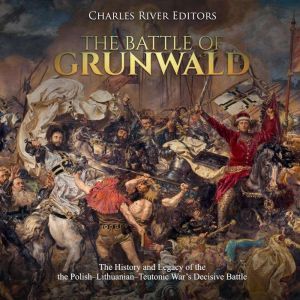
List: $6.95
| Sale: $4.87
Club: $3.47
Battle of Grunwald, The: The History and Legacy of the the Polish-Lithuanian-Teutonic War's Decisive Battle
Author: Charles River Editors
Narrator: Gregory T. Luzitano
Unabridged: 1 hr 40 min
Format: Digital Audiobook Download
Publisher: Findaway Voices
Published: 09/14/2019
Category: History - Medieval
Synopsis
While the military orders are now often tied to religion or conspiracy theories, they did once wield great power and influence in Europe, and their actions had consequences centuries after they had reached their peak. This was made clear in the wake of a major battle fought between German and Russian forces from August 26-30, 1914 during the First World War. It occurred in Masuria, a region of marshes, woodland, and numerous lakes in northern Poland, almost 400,000 men were involved, and it was a decisive victory for the Germans, who annihilated the Russian army. The Germans named the battle after Tannenberg (Polish Stebark), and the battle, though widely fought over 100 miles, did indeed encompass the village, but there was a historical reason for assigning the name to the battle. On July 15, 1410, Tannenberg was the site of another decisive battle between the army of the Germanic Teutonic Order and that of Poland-Lithuania, a battle now commonly referred to as the Battle of Grunwald (after another nearby village). German nationalism saw the destruction of the Russians as vengeance upon the Slavs for the defeat of 1410, and the Nazis also exploited that sentiment during their invasions of Poland and Russia. Conversely, for Poles and Russians, the Teutonic Knights were precursors of the rapacious Germans of the Second and Third Reichs, and Grunwald was a symbol of freedom and resistance. These sentiments remain strong to this day. These considerations aside, the Battle of Grunwald was significant for a number of reasons. It marked the end of the German colonization of Slavic and Baltic lands in northeastern Europe that had begun in the 12th century. It therefore also marked the beginning of an age when the Slavic (principally the Polish) peoples could grow and expand without interference from the West. The battle also signified the end of the Teutonic Knights as a major power and marked the rise of the Polish-Lithuanian Commonwealth.